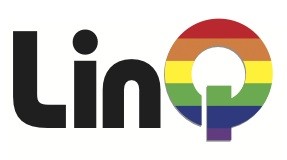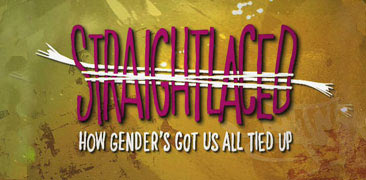Straightlaced, How Gender’s Got Us All Tied Up, a documentary by Debra Chasnoff, shows on Saturday, September 22 at 10 am at the Kentucky Theater in downtown Lexington.
This film includes stories from fifty U.S. high school students who speak frankly and powerfully about their experiences with gender, gender identity and sexual orientation. While most of the youth interviewed do identify as male or female, they talk about how social norms limit their choices. Some express a felt need to be vigilant, to make sure their clothes, behavior and attitudes fit inside the male or female gender box.
Others share how their gender identity doesn’t conform to social expectations. For example, Verde shares, “I’m not just female. You know, my body may be, and other people may think that’s how I identify . . . [but] it doesn’t match.” Sky adds, “My experience is that there’s not two genders; there’s really a spectrum. There’s everything from boy and girl, to transgender to, uh, tomboy. And part of growing up is finding out where you fit on that spectrum.”
The second part of the movie addresses the intersection of gender and sexuality as youth explore their feelings about sexuality, homophobia, and transphobia. Briseida talks about her struggle to regain a “sense of self” after coming out as a lesbian: “You know how people say that you’re hiding in the closet?” she notes. “It’s not a closet . . . it’s sort of like a prison.”
A young man, who does not seem to identify as gay, poignantly notes that “having your sexuality questioned is a very powerful tool in controlling someone . . . it’s so easy to control somebody by questioning something that they don’t know, by making fun of something they can’t help.” Fortunately, many of these teens talk about how support from friends, and less often teachers, can make a difference. Rey, who identifies as transgender and transitioned during high school, notes, “I’m definitely thankful for my friends. They’re my support system. They’ve stuck with me through the whole way.”
Perhaps most striking for educators are the moments when youth speak of their experiences with school-based adults. Lance, who eventually filed a lawsuit to protect other students from the anti-gay harassment he experienced, reflects, “I had a group of teachers on campus that I was comfortable talking with. They would listen and they were sympathetic, but none of them stepped up as an advocate for me . . . none of them stepped up to make sure I was gonna be safe.”
Straightlaced is a compelling film that offers a unique view into the lives of adolescents across America. Young people need our support and our help to create schools where bullying and harassment are not tolerated and where real dialogue can occur. If you want to contribute to school safety, consider financially supporting or volunteering time with the Gay Lesbian Service Organization. We have been working with teens for twelve years.
Our Gay Straight Alliance (GSA) for youth is working to support school GSAs. For information contact Mary Crone at mary@glso.org or visit our website at www.lexgsa.org

